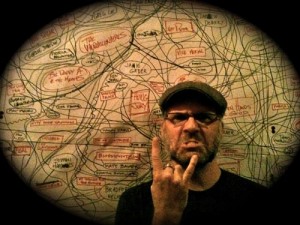I’m looking for ideas for collecting, untangling and sharing data effectively. As a specific case study, I’m interested in creating an interactive model that captures and shares more detail than the paper tangle below can. The image below is known as the “Windsor Music Tangle” and it hangs on the wall in Phog Lounge in Windsor, Ontario Canada. While the example might be geographically distant from this weekend’s unconference, the type of data and the strategies needed to model it would be broadly applicable.
 To untangle a little bit: Windsor has a lively music scene. The music scene is made of bands, individual musicians, songs, instruments, venues, supporters, etc. People come and go, venues open and close, people play guest spots in other bands, bands break up and reform, etc. People move on to work not connected to the music scene at all. What would be needed to trace a path of an individual musician, follow their work, hear and see clips, and trace everyone they’ve ever worked with – and who they’ve yet to connect with?
To untangle a little bit: Windsor has a lively music scene. The music scene is made of bands, individual musicians, songs, instruments, venues, supporters, etc. People come and go, venues open and close, people play guest spots in other bands, bands break up and reform, etc. People move on to work not connected to the music scene at all. What would be needed to trace a path of an individual musician, follow their work, hear and see clips, and trace everyone they’ve ever worked with – and who they’ve yet to connect with?
Going further, would it be possible to outline a path of the community’s changing musical interests over time? Back in the 80s, punk bands made regular stops in venues that have since been bull-dozed for the casino. Jazz clubs have come and gone. Swing music and dancing made a comeback in the early 2000s. Venues have shifted style. Could all of this be represented in the Tangle? How far back could we go? And how to capture that this data is people, relationships, community? All of this suggests a need to consider and be mindful towards the emotional connection people feel towards the data, i.e. these aren’t just names and numbers.
Once we’ve identified appropriate tools for such a project, what are proven methods of finding and encouraging people to contribute? This is the kind of project that could appeal to people of different skill levels, ages, etc. and a lot of the people with valuable knowledge are not going to be connected to things like Twitter or Facebook. At the moment, the paper tangle sits in Phog and visitors there contribute, but what can be done to reach the broader community and enlist support and contributions from the community (including the university)? And how best to dig up historical data so that the data reaches back instead of capturing only relatively recent history?
Are there other projects like this? Would love to talk tools and strategies that worked/didn’t work for others.
Photo is from “Windsor’s missing link” by Alishia Fox.



